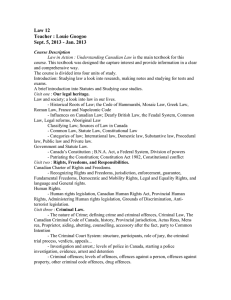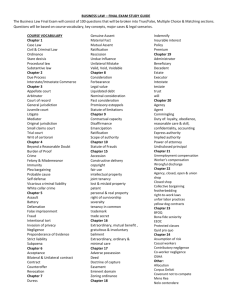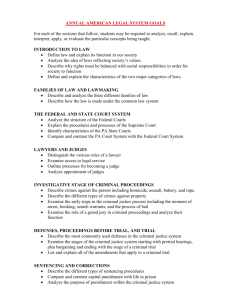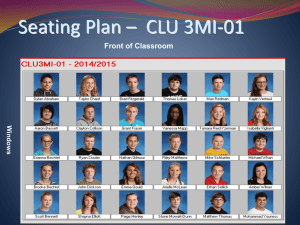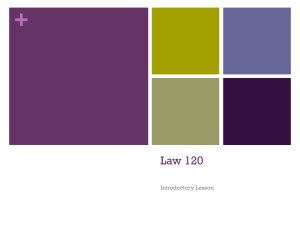Law 12 Course Outline 2014-2015 / Microsoft Word document
advertisement
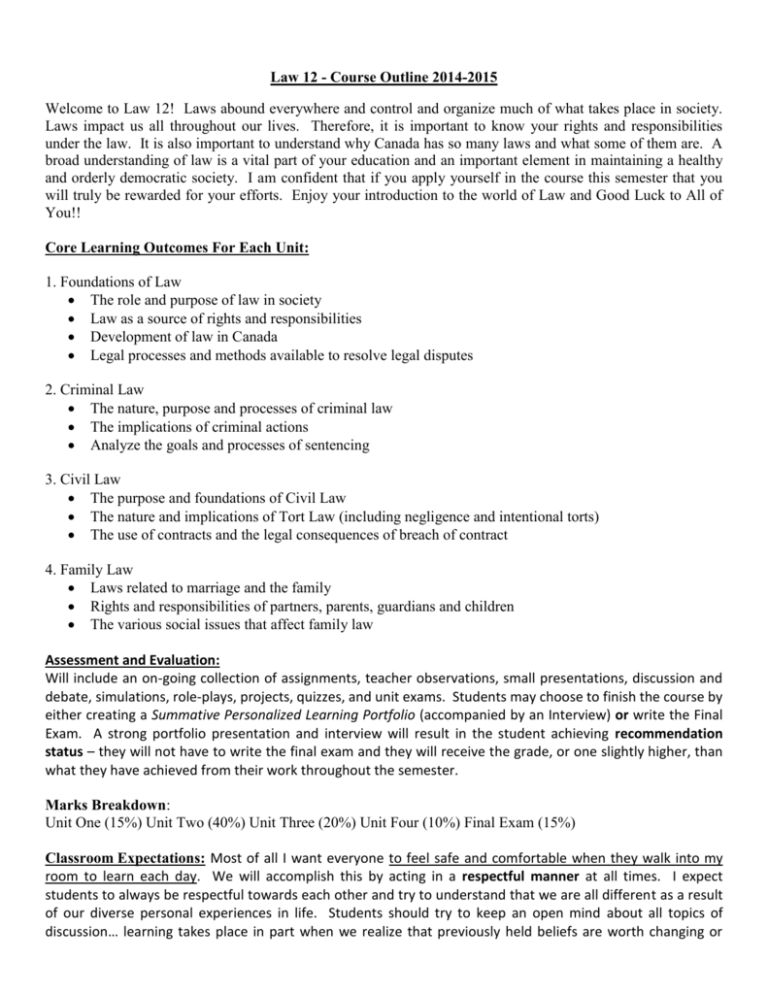
Law 12 - Course Outline 2014-2015 Welcome to Law 12! Laws abound everywhere and control and organize much of what takes place in society. Laws impact us all throughout our lives. Therefore, it is important to know your rights and responsibilities under the law. It is also important to understand why Canada has so many laws and what some of them are. A broad understanding of law is a vital part of your education and an important element in maintaining a healthy and orderly democratic society. I am confident that if you apply yourself in the course this semester that you will truly be rewarded for your efforts. Enjoy your introduction to the world of Law and Good Luck to All of You!! Core Learning Outcomes For Each Unit: 1. Foundations of Law The role and purpose of law in society Law as a source of rights and responsibilities Development of law in Canada Legal processes and methods available to resolve legal disputes 2. Criminal Law The nature, purpose and processes of criminal law The implications of criminal actions Analyze the goals and processes of sentencing 3. Civil Law The purpose and foundations of Civil Law The nature and implications of Tort Law (including negligence and intentional torts) The use of contracts and the legal consequences of breach of contract 4. Family Law Laws related to marriage and the family Rights and responsibilities of partners, parents, guardians and children The various social issues that affect family law Assessment and Evaluation: Will include an on-going collection of assignments, teacher observations, small presentations, discussion and debate, simulations, role-plays, projects, quizzes, and unit exams. Students may choose to finish the course by either creating a Summative Personalized Learning Portfolio (accompanied by an Interview) or write the Final Exam. A strong portfolio presentation and interview will result in the student achieving recommendation status – they will not have to write the final exam and they will receive the grade, or one slightly higher, than what they have achieved from their work throughout the semester. Marks Breakdown: Unit One (15%) Unit Two (40%) Unit Three (20%) Unit Four (10%) Final Exam (15%) Classroom Expectations: Most of all I want everyone to feel safe and comfortable when they walk into my room to learn each day. We will accomplish this by acting in a respectful manner at all times. I expect students to always be respectful towards each other and try to understand that we are all different as a result of our diverse personal experiences in life. Students should try to keep an open mind about all topics of discussion… learning takes place in part when we realize that previously held beliefs are worth changing or amending at times and that our feeling about what is true may not always stand the test of time. I expect students to keep asking themselves whether or not their actions and words are respectful … this will hopefully make Room 301 a great place to hang out and learn!! Law 12 covers some sensitive topics, so it is extra important to participate in a MATURE manner that will not upset other members of our class. You are welcome to share your own personal experiences when appropriate, but otherwise approach topics from a 3rd person perspective (do not mention others in the first person/by name). Due to the sensitive nature of some of the topics please be sure to talk to me if you have any concerns and we can work together to make alternate arrangements if need be. Other expectations include: trying your best, coming to class prepared, returning everything to its proper place, listening politely when others are talking and using technology as a supportive resource in an appropriate manner and at appropriate times. We will discuss further expectations as a class. Students are encouraged to talk with Mr. Ververgaert to discuss difficulties they may be encountering during the course. Appointments can be set up to talk before school, at lunchtime, or after school at the convenience of the student and teacher. Parents are asked to call Mr. Ververgaert at the school (604-668-6668) or email him at: rververgaert@sd38.bc.ca to discuss any questions or concerns that they may have, or send him a letter outlining any learning concerns that their son or daughter may be challenged by. Good Luck and have a Great Semester!!! Student Signature __________________________________ Parent Signature __________________________________ Comments/Questions: Law 12: Unit 1 ELO’s (Foundations of Law) 1A 1B 1C Describe the Principles of Law Define law and its purpose and functions in society Describe the divisions of law in Canadian society (substantive, procedural, public, private) Describe the historical foundation of law Define the concept of legal precedent Describe the structure and jurisdiction of the Canadian Law System Identify the primary sources of law in Canada (common law, statute law, constitutional law) Describe how and why laws change and the consequences of such change in society Outline the evolution of Canada’s Constitution with reference to division of powers, rule of law, and repatriation Identify the steps to pass laws at the federal and provincial level in Canadian society Describe Canadian interpretation of International Law Describe the status of sovereign states Identify international organizations that promote and apply international law 1D Describe the Development and Impact of the Canadian Charter of Rights and Freedoms and Human Rights and Freedoms Identify key elements of the Universal Declaration of Human Rights Describe the Canadian Bill of Rights and the Canadian Charter of Rights *freedom of conscience and religion *mobility rights *freedom of thought and expression *equality rights *democratic rights *language rights Express an understanding for human rights legislation and describe various illegal instances of discrimination *women’s rights *rights for people with disabilities *aboriginal rights *rights of the poor *gay and lesbian rights Law 12: Unit 2 ELO’s (Criminal Law) 2A Describe the Principles of Criminal Law Describe Criminal Law and its purpose (interests of state and society) Elements that make actions criminal in nature *Actus Reus *Regulatory Offenses *Mens Rea *Attempt and Conspiracy Types of Criminal Offenses *Summary conviction *Indictable *Hybrid Parties to an Offense *Aiding and Abetting *Accessory after the Fact Violent Crimes and Areas with High Social Impact Property Crimes Analyse the Processes of Criminal Law Rights of the Accused Arrest and Release Procedures Citizens Rights and Search Laws Sentencing Procedures and Objectives 2B 2C Describe Our Criminal Court System Court Structure and Organization Court Procedures *Juries *Jury Selection *Presentation of Evidence *Reaching a Verdict Teacher: R. Ververgaert Steveston London Secondary Email: rververgaert@sd38.bc.ca Law 12: Unit 3 ELO’s (Civil and Contract Law) 3A 3B 3C Describe how Civil Disputes are Resolved Civil Courts Civil Trial Procedures Alternative Dispute Resolution Describe Negligence and Intentional Torts Elements of Negligence and Intentional Torts Defenses for Negligence and Intentional Torts Resolution, remedies and enforcement of Tort Law Special types of Negligence and Trespassing Laws and Defenses Defamation of Character and its Defenses The Need for, and Elements of, Valid Contracts Agreement, Offer, Acceptance of Contracts Consideration, Capacity, Consent and Lawful Purpose of Contracts Discharging the Contract, Breach of Contract and Civil Remedies to Breach Law 12: Unit 4 ELO’s (Civil and Contract Law) 4A 4B Analyse the Purpose and Effects of Law Related to Families Describe the laws related to marriage (common-law, formal) Requirements for marriage Separation and divorce Family mediation Describe Children and Family Law Custody of children and child support Adoption

